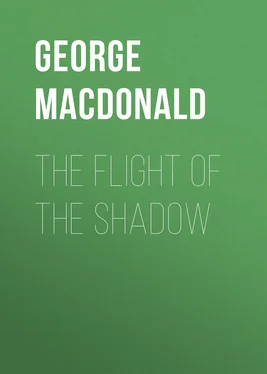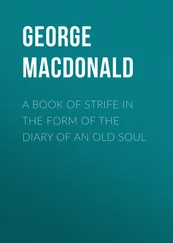George MacDonald - The Flight of the Shadow
Здесь есть возможность читать онлайн «George MacDonald - The Flight of the Shadow» — ознакомительный отрывок электронной книги совершенно бесплатно, а после прочтения отрывка купить полную версию. В некоторых случаях можно слушать аудио, скачать через торрент в формате fb2 и присутствует краткое содержание. Жанр: foreign_prose, foreign_religion, foreign_antique, на английском языке. Описание произведения, (предисловие) а так же отзывы посетителей доступны на портале библиотеки ЛибКат.
- Название:The Flight of the Shadow
- Автор:
- Жанр:
- Год:неизвестен
- ISBN:нет данных
- Рейтинг книги:4 / 5. Голосов: 1
-
Избранное:Добавить в избранное
- Отзывы:
-
Ваша оценка:
- 80
- 1
- 2
- 3
- 4
- 5
The Flight of the Shadow: краткое содержание, описание и аннотация
Предлагаем к чтению аннотацию, описание, краткое содержание или предисловие (зависит от того, что написал сам автор книги «The Flight of the Shadow»). Если вы не нашли необходимую информацию о книге — напишите в комментариях, мы постараемся отыскать её.
The Flight of the Shadow — читать онлайн ознакомительный отрывок
Ниже представлен текст книги, разбитый по страницам. Система сохранения места последней прочитанной страницы, позволяет с удобством читать онлайн бесплатно книгу «The Flight of the Shadow», без необходимости каждый раз заново искать на чём Вы остановились. Поставьте закладку, и сможете в любой момент перейти на страницу, на которой закончили чтение.
Интервал:
Закладка:
George MacDonald
The Flight of the Shadow
CHAPTER I. MRS. DAY BEGINS THE STORY
I am old, else, I think, I should not have the courage to tell the story I am going to tell. All those concerned in it about whose feelings I am careful, are gone where, thank God, there are no secrets! If they know what I am doing, I know they do not mind. If they were alive to read as I record, they might perhaps now and again look a little paler and wish the leaf turned, but to see the things set down would not make them unhappy: they do not love secrecy. Half the misery in the world comes from trying to look, instead of trying to be, what one is not. I would that not God only but all good men and women might see me through and through. They would not be pleased with everything they saw, but then neither am I, and I would have no coals of fire in my soul’s pockets! But my very nature would shudder at the thought of letting one person that loved a secret see into it. Such a one never sees things as they are—would not indeed see what was there, but something shaped and coloured after his own likeness. No one who loves and chooses a secret can be of the pure in heart that shall see God.
Yet how shall I tell even who I am? Which of us is other than a secret to all but God! Which of us can tell, with poorest approximation, what he or she is! Not to touch the mystery of life—that one who is not myself has made me able to say I , how little can any of us tell about even those ancestors whose names we know, while yet the nature, and still more the character, of hundreds of them, have shared in determining what I means every time one of us utters the word! For myself, I remember neither father nor mother, nor one of their fathers or mothers: how little then can I say as to what I am! But I will tell as much as most of my readers, if ever I have any, will care to know.
I come of a long yeoman-line of the name of Whichcote. In Scotland the Whichcotes would have been called lairds ; in England they were not called squires . Repeatedly had younger sons of it risen to rank and honour, and in several generations would his property have entitled the head of the family to rank as a squire, but at the time when I began to be aware of existence, the family possessions had dwindled to one large farm, on which I found myself. Naturally, while some of the family had risen, others had sunk in the social scale; and of the latter was Miss Martha Moon, far more to my life than can appear in my story. I should imagine there are few families in England covering a larger range of social difference than ours. But I begin to think the chief difficulty in writing a book must be to keep out what does not belong to it.
I may mention, however, my conviction, that I owe many special delights to the gradual development of my race in certain special relations to the natural ways of the world. That I was myself brought up in such relations, appears not enough to account for the intensity of my pleasure in things belonging to simplest life—in everything of the open air, in animals of all kinds, in the economy of field and meadow and moor. I can no more understand my delight in the sweet breath of a cow, than I can explain the process by which, that day in the garden—but I must not forestall, and will say rather—than I can account for the tears which, now I am an old woman, fill my eyes just as they used when I was a child, at sight of the year’s first primrose. A harebell, much as I have always loved harebells, never moved me that way! Some will say the cause, whatever it be, lies in my nature, not in my ancestry; that, anyhow, it must have come first to some one—and why not to me? I answer, Everything lies in everyone of us, but has to be brought to the surface. It grows a little in one, more in that one’s child, more in that child’s child, and so on and on—with curious breaks as of a river which every now and then takes to an underground course. One thing I am sure of—that, however any good thing came, I did not make it; I can only be glad and thankful that in me it came to the surface, to tell me how beautiful must he be who thought of it, and made it in me. Then surely one is nearer, if not to God himself, yet to the things God loves, in the country than amid ugly houses—things that could not have been invented by God, though he made the man that made them. It is not the fashionable only that love the town and not the country; the men and women who live in dirt and squalor—their counterparts in this and worse things far more than they think—are afraid of loneliness, and hate God’s lovely dark.
CHAPTER II. MISS MARTHA MOON
Let me look back and see what first things I first remember!
All about my uncle first; but I keep him to the last. Next, all about Rover, the dog—though for roving, I hardly remember him away from my side! Alas, he did not live to come into the story, but I must mention him here, for I shall not write another book, and, in the briefest summary of my childhood, to make no allusion to him would be disloyalty. I almost believe that at one period, had I been set to say who I was, I should have included Rover as an essential part of myself. His tail was my tail; his legs were my legs; his tongue was my tongue!—so much more did I, as we gambolled together, seem conscious of his joy than of my own! Surely, among other and greater mercies, I shall find him again! The next person I see busy about the place, now here now there in the house, and seldom outside it, is Miss Martha Moon. The house is large, built at a time when the family was one of consequence, and there was always much to be done in it. The largest room in it is now called the kitchen, but was doubtless called the hall when first it was built. This was Miss Martha Moon’s headquarters.
She was my uncle’s second cousin, and as he always called her Martha, so did I, without rebuke: every one else about the place called her Miss Martha.
Of much greater worth and much more genuine refinement than tens of thousands the world calls ladies, she never claimed the distinction. Indeed she strongly objected to it. If you had said or implied she was a lady, she would have shrunk as from a covert reflection on the quality of her work. Had she known certain of such as nowadays call themselves lady-helps, I could have understood her objection. I think, however, it came from a stern adherence to the factness—if I may coin the word—of things. She never called a lie a fib.
When she was angry, she always held her tongue; she feared being unfair. She had indeed a rare power of silence. To this day I do not know , but am nevertheless sure that, by an instinct of understanding, she saw into my uncle’s trouble, and descried, more or less plainly, the secret of it, while yet she never even alluded to the existence of such a trouble. She had a regard for woman’s dignity as profound as silent. She was not of those that prate or rave about their rights, forget their duties, and care only for what they count their victories.
She declared herself dead against marriage. One day, while yet hardly more than a child, I said to her thoughtfully,
“I wonder why you hate gentlemen, Martha!”
“Hate ‘em! What on earth makes you say such a wicked thing, Orbie?” she answered. “Hate ‘em, the poor dears! I love ‘em! What did you ever see to make you think I hated your uncle now?”
“Oh! of course! uncle!” I returned; for my uncle was all the world to me. “Nobody could hate uncle!”
“She’d be a bad woman, anyhow, that did!” rejoined Martha. “But did anybody ever hate the person that couldn’t do without her, Orbie?”
My name—suggested by my uncle because my mother died at my birth—was a curious one; I believe he made it himself. Belorba it was, and it means Fair Orphan .
Читать дальшеИнтервал:
Закладка:
Похожие книги на «The Flight of the Shadow»
Представляем Вашему вниманию похожие книги на «The Flight of the Shadow» списком для выбора. Мы отобрали схожую по названию и смыслу литературу в надежде предоставить читателям больше вариантов отыскать новые, интересные, ещё непрочитанные произведения.
Обсуждение, отзывы о книге «The Flight of the Shadow» и просто собственные мнения читателей. Оставьте ваши комментарии, напишите, что Вы думаете о произведении, его смысле или главных героях. Укажите что конкретно понравилось, а что нет, и почему Вы так считаете.












